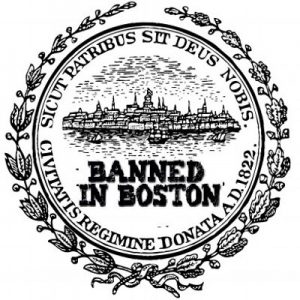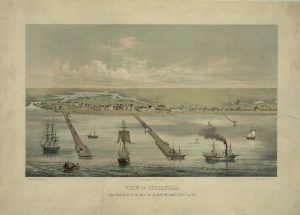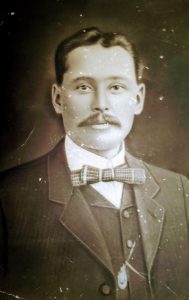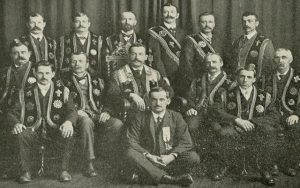 As genealogists, we can become quite proprietary about our research – there can be a sense that our work on the far-flung branches of our family trees gives us a kind of ownership of the past. Recently, I’ve experienced another sort of ownership, that claimed by the family being studied. I should add that this dynamic – I own the past, not you – is not a new one, but it never fails to surprise me. Continue reading Banned in Boston
As genealogists, we can become quite proprietary about our research – there can be a sense that our work on the far-flung branches of our family trees gives us a kind of ownership of the past. Recently, I’ve experienced another sort of ownership, that claimed by the family being studied. I should add that this dynamic – I own the past, not you – is not a new one, but it never fails to surprise me. Continue reading Banned in Boston
Tag Archives: Spotlight
Salt Lake City
 Just shy of my seventieth birthday, I finally made it to Salt Lake City. I am a notoriously bad traveler (with a tendency toward such things as sciatica, migraines, and hives), but the occasion was the annual meeting of the American Society of Genealogists, and since this was the first meeting after my election as a Fellow last October it seemed rather rude not to show up.
Just shy of my seventieth birthday, I finally made it to Salt Lake City. I am a notoriously bad traveler (with a tendency toward such things as sciatica, migraines, and hives), but the occasion was the annual meeting of the American Society of Genealogists, and since this was the first meeting after my election as a Fellow last October it seemed rather rude not to show up.
I survived the trip and got to enjoy three mild, sunny October days in Salt Lake (the fourth day was cold and windy). I enjoyed meeting new colleagues and seeing old faces, some not seen in 30 or more years. Rachal Mills Lennon is our newest Fellow. Continue reading Salt Lake City
Not always what you think
 Next weekend, Bill Griffeth and I will be speaking at the Brattleboro Literary Festival on DNA and genealogy, and the surprise results described in his book The Stranger in My Genes. For those who are not are familiar with the book, it all started when DNA results were compared between Bill, his brother, and their first cousin. In their case, Bill’s mother was able to provide additional details explaining the surprise results. (I won’t spoil them.) Continue reading Not always what you think
Next weekend, Bill Griffeth and I will be speaking at the Brattleboro Literary Festival on DNA and genealogy, and the surprise results described in his book The Stranger in My Genes. For those who are not are familiar with the book, it all started when DNA results were compared between Bill, his brother, and their first cousin. In their case, Bill’s mother was able to provide additional details explaining the surprise results. (I won’t spoil them.) Continue reading Not always what you think
Remarriage
 The question came up after last week’s post about the length of mourning periods between remarriages in seventeenth-century New England. It has always been my (undocumented) impression that the traditional one-year mourning period was usually observed except for emergency situations, such as the need to care for infant and young children.
The question came up after last week’s post about the length of mourning periods between remarriages in seventeenth-century New England. It has always been my (undocumented) impression that the traditional one-year mourning period was usually observed except for emergency situations, such as the need to care for infant and young children.
I looked around for some studies to see if I could back that up with statistics, but so far I have not found anything that particularly applies to early New England – a lot yet to track down, especially in books that are not available online. So I decided to start my own study using the Early New England Families sketches. Continue reading Remarriage
‘The flower of our manhood’

61 Bowdoin Street, Boston, Sunday, 12 February 1865: Tomorrow Huntington Wolcott[2] goes off, as Lieutenant, to join his regiment, and enter on his new career. He is only 19, and leaves an indulgent and affluent home, a life of the most sheltered & cultivated refinement, for the rude privations of camp life. God protect him, the brave lad, morally and bodily.
He is but 8 or 9 months older than my Frank;[3] how thankful I felt when the war broke out nearly 4 years ago that my boys were all too young to go – but now, it lingers on so wearily & yet so necessarily, that I often think I may yet have to send my treasures in faith & trust as so many brave hearted mothers have done ere now. Dr. Gray however says Frank’s college course must be finished first – then will be time enough for him to think of the army if needed – now, he has not the physique for it either – and is only 18 last fall too. Continue reading ‘The flower of our manhood’
A name and a history

As Hurricane Harvey headed for the Gulf Coast of Texas this past month, my thoughts turned toward a distant connection of mine commemorated in an old Indianola, Texas, cemetery: Continue reading A name and a history
Seduction’s double

Recently, I was prompted to take a ‘second look’ at my wife’s grandfather, Horace Fenton Bloodgood. Fenton married my wife’s grandmother, a young Spanish girl named Magdalena Murrieta,[1] in Buena Vista, Sonora, Mexico, in 1908 while working for the railroad.[2] (He was 41 and she 16.) Family lore was that the senior Bloodgoods were so outraged by Fenton’s errant disrespect of the status quo that he had already been largely disowned prior to his parents’ deaths and his marriage to Magdalena. Indeed, Fenton was left only the proverbial $1.00 in the will of his father Julius Bloodgood. Continue reading Seduction’s double
Pacific Clipper

As my grandfather[1] prepared to graduate from college, he was ready to cast off academics and explore the world instead of following his father into a law career. Generations of his sea-faring family had literally charted the way, and the possibilities beckoned to him every time he gazed out the windows of his home towards San Francisco’s (then bridgeless) Golden Gate.
He signed on as an ordinary seaman aboard the Hollywood, a World War I-era freighter in McCormick Steamship Company’s Pacific-Argentine-Brazil Line, and his salary was $45 a month plus room and board … such as it was. Continue reading Pacific Clipper
Fraternally yours
 Fraternal organizations are not as commonplace for most people today as they were back in the mid-1800s on through the twentieth century. Our ancestors joined these groups for camaraderie, financial support regarding burials, insurance, and more. There were hundreds of such organizations, some of which popped up for just a brief few years. Continue reading Fraternally yours
Fraternal organizations are not as commonplace for most people today as they were back in the mid-1800s on through the twentieth century. Our ancestors joined these groups for camaraderie, financial support regarding burials, insurance, and more. There were hundreds of such organizations, some of which popped up for just a brief few years. Continue reading Fraternally yours
‘The difference it makes’

61 Bowdoin Street, Boston, Sunday, 12 February 1865: Mary [Gray][2] is in a state of very happy excitement because her father has withdrawn his prohibition against round-dancing.[3] It is very inconsistent I suppose and all that, but I have long felt a question about it; whether the old fashioned prejudices of her parents ought to enforce themselves to her exclusion from a pleasure all her young friends were allowed, and enjoyed so highly.
She enjoys dancing the “German” as much as any one – but has never remonstrated against our decision, and gave it up 2 or 3 years ago without complaint. Then several other girls of her set said they were not to dance it – and it seemed as if she would have plenty of companionship in abstaining, but one after another they have all concluded to dance it and she was left almost alone – and it does make a great difference in a young lady’s enjoyment of society: it sets her completely apart from the dancing and makes a wall-flower of her at once, for there are never more than two or three square dances of an evening. Continue reading ‘The difference it makes’